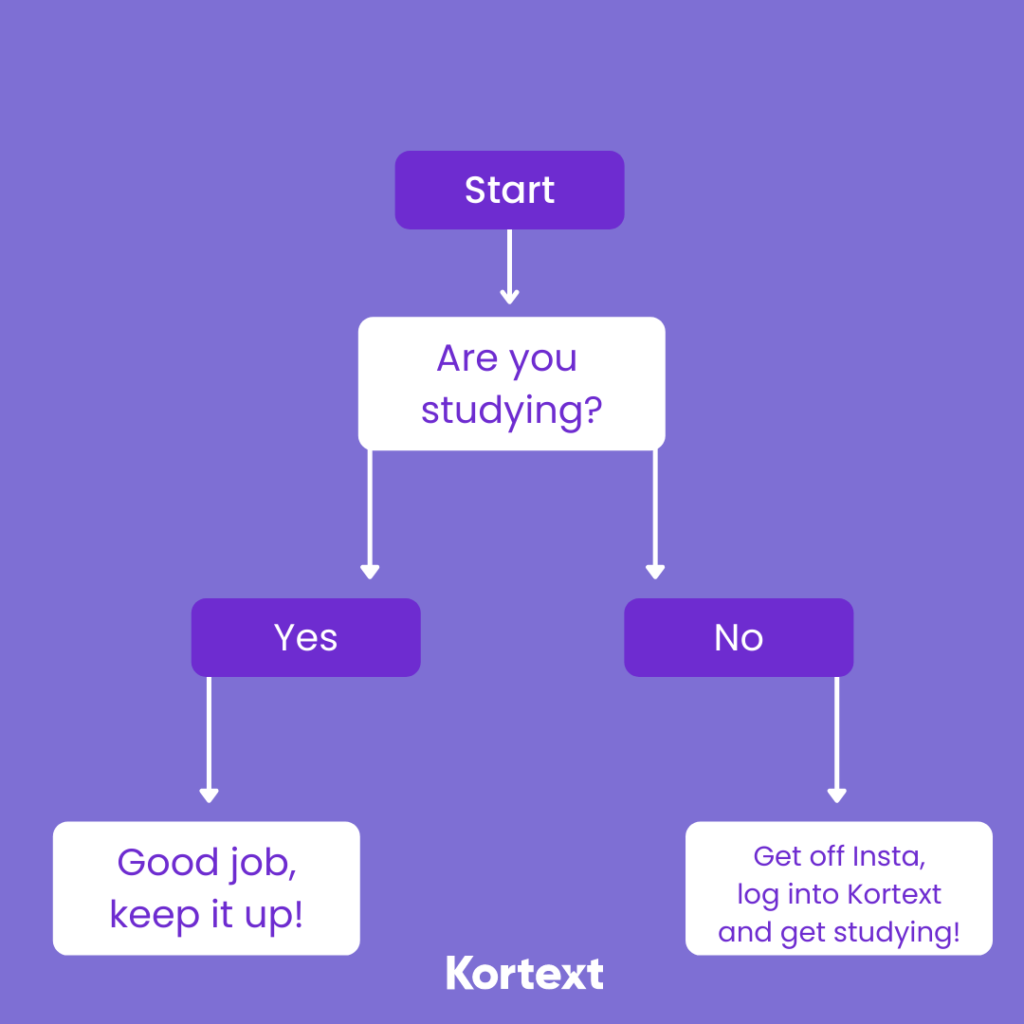Spring is upon us meaning brighter starts, lighter evenings and festival season is just around the corner, but before you can get there, there’s a big obstacle in the way.
Exam season.
Hey, we heard that sigh!
Don’t worry, we’ve compiled the *ultimate* study guide to help you ace your exams this year and let you pass like the boss you are. Are you ready?
Okay, let’s go.
Map out your exams
Using a spreadsheet, mark out all of your exams and deadlines. From personal experience, we found a Gantt chart works quite well for this.
We know you’re thinking: “What’s a Gantt chart?”, because we once thought the same, but fear not, we’ve got you covered.
Watch the handy video below for tips on how to make an exam Gantt chart.
Once you’ve mapped out your exams and deadlines, you can begin by working backwards, breaking down everything you have to do to achieve your deadlines, as well as recording every element that may come up in the exam.
By breaking things down into smaller chunks, it makes everything feel more manageable and you’ll also feel a sense of pride and increased confidence when you manage to tick something off your list.
When it comes to studying, start with the thing you find hardest first. Once you get the hardest part out of the way, everything else will feel easier and you’ll have no excuses to put off studying.
Where’s the best place to study?
Well, with Kortext we all know you can study anytime, anywhere.
One of the best places to study is your university’s library. Librarians aren’t just for helping you find the right book; they are incredible at providing support when you’re feeling stressed and listen to any worries you may have, which is very common for exam season.
If the library is out of the question for you, you should seek out a space that is comfortable, quiet and away from distractions. Being in an environment like this will help you to get the most out of the time you spend revising.
Please, please, please do NOT procrastinate
This is, of course, easier said than done, especially if you’re studying for something that you find difficult or don’t enjoy.
Whilst procrastination can be fun because you’re distracting yourself, you’re only making things worse in the long run, as it will increase your stress levels when you realise how little time you have left to complete your assignments and study.
One of the first things to do to avoid procrastination is to actually recognise it. Here’s a handy diagram that will help you spot procrastination:

I know our TikTok account is alluring, but quit scrolling and download the Kortext app if you must keep your thumbs busy whilst on your phone.
P.s, if you want more on how to avoid procrastination, we covered it in more detail in a blog last summer.
Strategies
If you fail to plan, you’re planning to fail!
Spending a little time finding a revision strategy that works best for you will help with motivation and productivity. Below are some of the most effective revision and study techniques out there that have been tried and tested by students world over, time and time again.
Past papers
Often, your university library will have copies of past papers available, and you can use them in several ways to get the most out of them.
One thing you can do is compile all questions into a spreadsheet and write answers for them. By writing answers for every question, you’re testing your knowledge, improving your answer writing ability and allowing yourself to research any elements you don’t yet know.
You can also complete the past papers in timed conditions to understand what the exam could be like, as well as practise your ability to complete the exam within the timeframe.
Another way that you can utilise past papers is by looking at the grade boundaries and weightings for the question, enriching your understanding of how comprehensive your answers should be.
Cue cards
Using cue cards, you can summarise key concepts and use them to prompt your memory. On average, people check their phones 58 times per day. Imagine the impact checking your cue cards 58 times per day would have?
Ditch your phone for a pack of cue cards!
Group studying
Collaboration is an excellent method of learning. With Kortext, you can study as a group remotely. An effective way to make best use of Kortext’s groups functionality would be to allocate set topics to each other and write notes to break it down to a memorable and understandable level.
You can also meet *IRL* to discuss concepts, test each other with cue cards and mark each other’s past papers. It works, trust us, we’ve been there.
Getting creative
Create diagrams, write raps and poems and memory hooks. Write prompts on post-it notes and stick them everywhere you can. Thinking out of the box will help you to create memorable methods of studying that will benefit you the most. Imagine thinking: I know that answer! It’s the post-it that was on the fridge!
You could even be the Stormzy of the exam hall (but in silence).
How do I cope with exam stress?
We knew this question was coming.
First, you want to try and minimise your stress by preparing as much as you can ahead of time. If you begin revision now, you’ll have plenty of time to ensure you know all you need to know for your exam plus a bit of extra time to revise, revise and revise some more.
Next, you want to take care of yourself. Eat right, drink plenty of water, take breaks, exercise, get some sleep and treat yourself when you’ve achieved something.
If you don’t look after yourself, you won’t feel your best.
If you don’t feel your best, will you do your best?
Probably not.
Here’s an editable study timetable that you can use with prompts to take breaks, get some exercise and drink!
And remember, feeling stressed is entirely normal. We’ve partnered with Student Minds and embedded a direct link to their Student Space within your Kortext Bookshelf to give you support when you need it most. We’ve shared how to avoid stress –but you can visit their site for tips on how to manage it.
That’s enough procrastination for you. You’ve now got everything you need to get going. What are you waiting for?
Log into Kortext and get studying!







